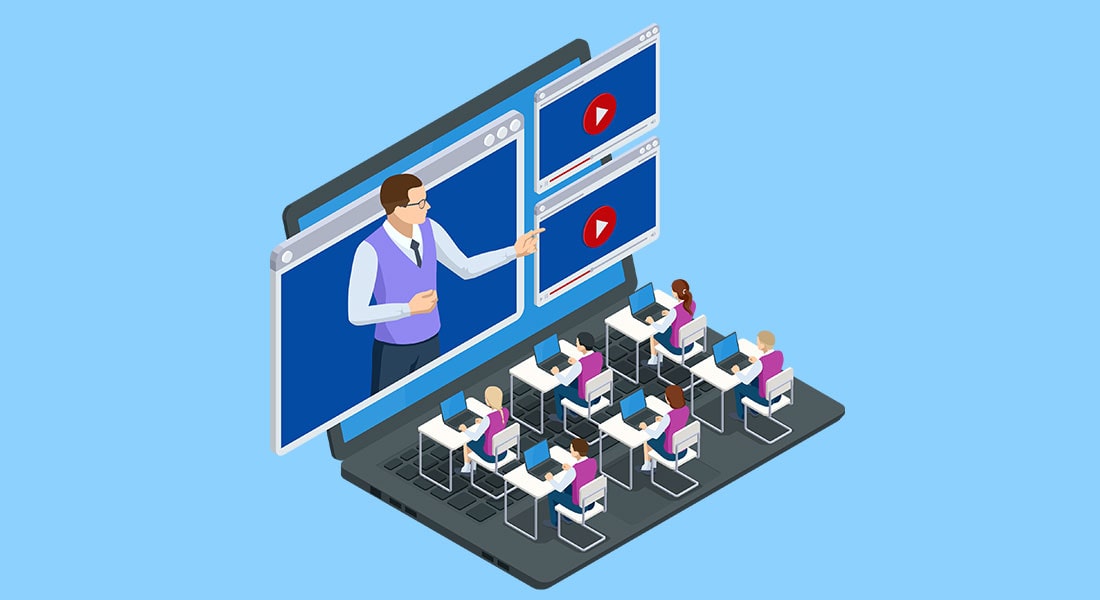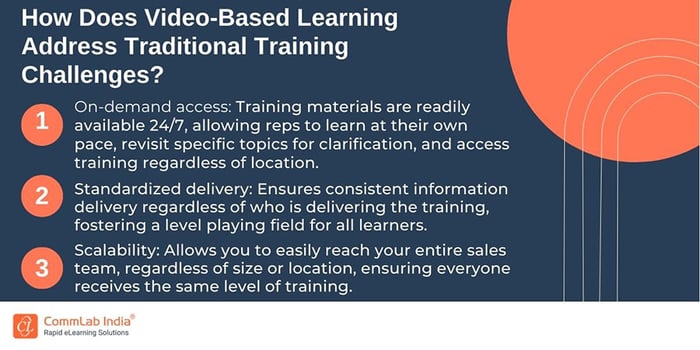Why Choose Video-Based Learning to Level Up Your Team’s Sales Game?
Wondering if video-based learning is the right choice to train your sales teams? Read on for guidance...

Are traditional training methods leaving your sales team feeling uninspired and lagging behind? It's time to ditch the dry lectures and embrace the power of video-based learning! This innovative approach is revolutionizing the way sales teams acquire knowledge, hone their skills, and crush their sales goals.
Get ready to unlock a world of engaging, interactive learning that will transform your team into a powerhouse of sales superstars! We'll dive deep into the benefits of video-based learning, explore how it can boost your sales performance, and provide practical tips for implementing this exciting approach. So, buckle up and prepare to witness the sales-boosting magic of video!
Why is Video-Based Learning So Effective for Sales Reps?
Video-based learning benefits sales reps by:
- Boosting engagement and knowledge retention through visuals and interactivity.
- Offering flexibility with on-demand learning and revisiting options.
- Enhancing skill development through real-world scenarios and expert coaching.
- Providing cost-effectiveness with scalable content reaching a wider audience.
What is Video-Based Learning? How Does it Transform Training? [Video]
Let us now discuss how video-based learning helps boost your sales teams’ performance.
Why Choose Video-Based Learning to Level Up Your Team’s Sales Game?
Videos Supercharge Engagement and Knowledge Retention
Traditional training methods often rely heavily on text-based materials or lectures, which can be passive and lead to low engagement and knowledge retention. Video-based learning, however, breaks free from these limitations by leveraging the power of:
- Visuals: Engaging visuals like demonstrations, infographics, and animations capture attention and make learning more enjoyable.
- Storytelling: Weaving narratives into video content allows for information to be presented in a compelling and memorable way.
- Interactive elements: Integrating quizzes, polls, and branching scenarios within videos fosters active participation and reinforces learning.
Video-based learning is a multisensory approach that keeps your sales reps engaged and focused, leading to a deeper understanding of key concepts and improved knowledge retention compared to traditional methods.
Videos can Conquer Traditional Sales Training Challenges
Traditional sales training often faces challenges like scheduling conflicts, limited reach, and inconsistent delivery. Video-based learning eliminates these issues by offering flexible on-demand access to training materials. Reps can learn at their own pace, revisit specific topics for clarification, and access training regardless of location.
Video-based learning addresses traditional training challenges by offering:

1. Video-Based Success Stories Help Build Motivation
Sales training videos are not just about information delivery - they can be powerful motivational tools. By incorporating success stories from experienced sales reps, you can:
Motivate and Inspire Junior Reps: Witnessing the achievements of their peers can ignite a spark of inspiration in new sales reps. Seeing how others have overcome challenges and achieved success serves as a powerful motivator to push boundaries and strive for excellence.
Drive Sales Performance: Success stories showcase the tangible results of applying sales techniques and knowledge effectively. This real-world demonstration reinforces the importance of training and encourages reps to adopt the same strategies to boost their own performance.
Here is a video-based success story for your reference - How Can Microlearning Transform Sales Training? A Case Study Revealed!
2. Videos Make Product Demos Engaging and Effective
Product demos are vital for arming sales reps with the confidence and expertise needed to effectively present your offerings. Video-based learning excels in this area by:
Making Complex Features Easy to Understand: Complex product features can be difficult to grasp through text or lectures alone. Video demonstrations break down these features visually, using clear explanations and engaging visuals to ensure reps understand not just what the feature is, but also its value proposition and how to effectively explain it to customers.
Showcasing Real-World Applications: Videos can showcase real-world customer scenarios where the product features come into play. This provides context and allows reps to understand how the product solves customer problems and addresses their specific needs.
→ Download Case Study: Videos for Sales Process Training
3. Videos Promote a Learning Through Instant Updates
Keeping your sales team informed about new product features or updates is crucial for maintaining a competitive edge. Video-based learning offers a significant advantage in this regard:
Fast and Efficient Updates: Unlike traditional methods that require revisions and rescheduling, video content can be easily updated and distributed to the entire team quickly and efficiently. This ensures your reps are always equipped with the latest information to present to customers.
Scalability and Cost-Effectiveness: Once created, video content can be easily scaled to reach a large number of employees across different locations, eliminating the need for multiple training sessions. This translates to significant cost savings compared to traditional in-person training programs.
4. Video-Based Learning Encourages Skill Development Through Simulated Scenarios
Role-playing is a powerful technique for developing sales skills, allowing reps to practice communication, objection handling, and negotiation in a safe environment. Video-based learning takes this a step further through:
Realistic Sales Simulations: Videos can create realistic sales scenarios that mirror real-life customer interactions. This allows reps to practice their skills in a controlled environment, receive feedback from coaches or trainers, and refine their approach before stepping out into the field.
Multiple Scenario Variations: Video simulations can present variations of the same scenario, allowing reps to experience different customer personalities, objections, and negotiation styles. This prepares them to adapt their approach based on the specific situation they encounter.

5. Videos Boost Engagement with Interactive Elements
Learner engagement is key to maximizing the effectiveness of any training program. Video-based learning can be made even more interactive and engaging by incorporating elements like:
Quizzes and polls: These activities assess knowledge retention and allow for self-paced learning.
Branching scenarios: Allow users to choose their response to a situation and see the corresponding outcome, fostering critical thinking and decision-making skills.
Clickable elements: Embed hyperlinks to additional resources within the video, allowing users to delve deeper into specific topics if needed.
These interactive elements not only keep learners actively involved but also provide opportunities for self-assessment and personalized learning.
Invest in Your Sales Team's Success with Video-Based Learning
To wrap it up, we can highlight that investing in your sales team's continuous learning and development is crucial for sustained success. By embracing video-based learning, you can empower your reps with the knowledge, skills, and confidence they need to:
Effectively present your offerings and understand their value proposition.
Build strong relationships with customers and navigate complex sales interactions.
Confidently handle objections and close deals successfully.
Want to understand the practicality of video-based learning for your sales team? Here's a real-world example!
Download our comprehensive case study: "Videos for Sales Process Training" and see how video-based learning can:
- Empower your sales reps with the knowledge and skills they need to succeed.
- Boost engagement and knowledge retention.
- Drive measurable results in your sales performance.





